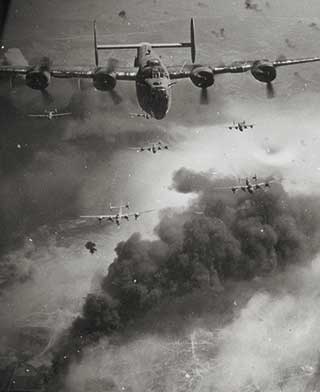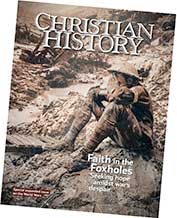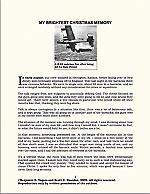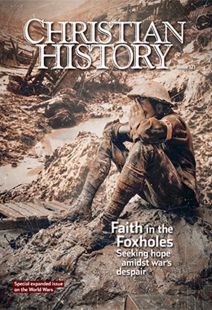Christmas miracles

[B-24s—Wikimedia / Jerry J. Jostwick]
During Christmas 1914 spontaneous gestures of goodwill erupted in some places on the Western Front.
“On Christmas Eve the firing practically ceased. I think both sides understood we were going to have a day off. Through the night we sang carols to one another. … When dawn arrived we started putting our head above the parapet and waved to each other. On our left was a brewery occupied by the Germans and to our surprise we saw a German come out and hold his hand up; behind him were two rolling a barrel of beer. They came halfway across. …
Three of us went out, shook hands with them, wished them a merry Christmas, and rolled the barrel to our own trenches amid the cheers of both British and Germans! After that it was understood that peace was declared for a day. We both got out of our trenches and met in the middle of the field, wished each other season’s greetings. The Germans said: ‘A merry Grismas!’ Some of them were quite good at English. … The Germans got permission from our officers to bury some of their dead which were lying near our lines. When darkness came we both went back to our trenches and the great European war was on again.” —Private Cunningham of the Scottish Rifles, reprinted in The Scotsman, January 5, 1915.
“Yesterday the British & Germans met & shook hands in the Ground between the trenches, & exchanged souvenirs. Yes, all day Xmas day, & as I write. Marvellous, isn’t it? Yes. This is only for about a mile or two on either side of us (so far as we know). … On Xmas eve both armies sang carols and cheered & there was very little firing. The Germans called to our men to come and fetch a cigar & our men told them to come to us. This went on for some time, neither fully trusting the other, until, after much promising to ‘play the game’ a bold Tommy crept out & stood between the trenches, & immediately a Saxon came to meet him. They shook hands & laughed then 16 Germans came out. Thus the ice was broken.”
—English soldier Henry Williamson (1895–1977) in a letter to his mother, December 26, 1914.
“The mist was slow to clear and suddenly my orderly threw himself into my dugout to say that both the German and Scottish soldiers had come out of their trenches and were fraternizing along the front. I grabbed my binoculars and … saw the incredible sight of our soldiers exchanging cigarettes, schnapps and chocolate with the enemy. Later a Scottish soldier appeared with a football which seemed to come from nowhere and a few minutes later a real football match got underway. The Scots marked their goal mouth with their strange caps and we did the same with ours. … After an hour’s play, when our Commanding Officer heard about it, he sent an order that we must put a stop to it. A little later we drifted back to our trenches and the fraternization ended.” —German lieutenant Johannes Niemann, recalling the truce in the 1960s.
Ben Vegors served in the Army Air Corps in World War II from 1942 to 1945 and flew 30 missions, but the one that made the greatest impression on him took place on Christmas Day 1944, as he told Christian History.
“On one mission we were shot up terribly; a terrible, horrible mission, on Christmas Day, 1944, my fourteenth mission. We bombed Waxweiler in Germany, just one of many towns that we bombed. On that day another plane flying beside us was shot down. Our plane got back without a scratch. That was Christmas Day.
Order Christian History #121: Faith in the Foxholes in print.
Subscribe now to get future print issues in your mailbox (donation requested but not required).
A good friend of mine who I led to the Lord just before combat was in the plane that was shot down. There were nine men who got out of the burning plane. The flames were going clear back to the tail of their plane. Each of them pulled the ripcord too soon. It just went up in a puff. They all fell to the ground. It left such a terrible impression on me that day, Christmas Day of 1944, that I said, ‘Lord, if you please spare my life I will serve you somehow as long as I live.’ And I meant it.
The effect of that mission just tore me up. It was the only experience like that I’ve had in my life. After that on our missions, I never had any fear that we wouldn’t get back. I believed that God would preserve us. He did preserve me. There were three times I was taken off the roster to fly, and those three days the plane crashed that I would have been in, and I would have been killed any of those three times. I realized that it was God who spared my life. That is the only explanation for it.
When I got back after the war, my mother wanted me to finish college and go to law school. I said no, I made a promise that if God spared my life I’d serve him all of my life. Since that time I’ve had just a marvelous life. I came here to Walla Walla, Washington, to be pastor of Trinity Baptist Church and the first Sunday I was here the chaplain from the local VA hospital asked me if I would come out for night calls. When he retired the director made me full-time chaplain. I told war stories a lot in the chapel, and a lot of the folks liked it.
I retired when I was 92 as the oldest chaplain in government service. I’ve had wonderful health I was blessed with. Every Wednesday morning I have a Bible class in the women’s nursing home. I’m 94 and I have a lot to be thankful for.” CH
Thanks to James D. Smith III of Bethel University for connecting us with Chaplain Vegors.
This article is from Christian History magazine #121 Faith in the Foxholes. Read it in context here!
By various
[Christian History originally published this article in Christian History Issue #121 in 2017]
Next articles
World Wars: Recommended resources
The landscape of resources about faith in the world wars is vast. Here are some recommendations from CH editorial staff and this issue’s authors.
the editorsThe ecumenical dilemma
Protestants and Catholics share their experiences of the intersection between the two groups—from the Reformation until the present day
John W. O’Malley, S.J., Paul Rorem, Ernest Freeman, John Armstrong, Thomas A. BaimaEarly Church Heroines: Rulers, Prophets and Martyrs
Early church historians tell of the accomplishments of Christian women.
Ida Besancon SpencerSupport us
Christian History Institute (CHI) is a non-profit Pennsylvania corporation founded in 1982. Your donations support the continuation of this ministry
Donate





